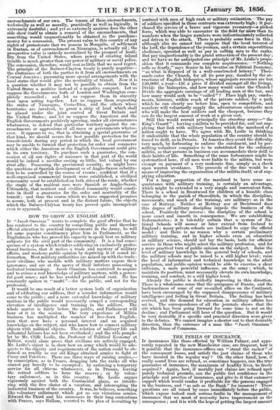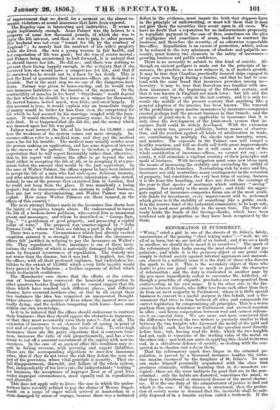THE PERILS OF INSURANCE.
IF insurances like those effected by William Palmer, and appa- rently repeated in the new Manchester case, are frequent, how is it possible that the insurance-offices can "stand the racket" of the consequent losses, and satisfy the just claims of those who have insured in the regular way ? On the other hand, how, if really sound lives are refused, as sometimes happens, can the time guarantee of insurance, the maximum n of healthy lives, be freely acquired? Again, how, if morally just claims are refused upon purely technical grounds, can the public feel confidence in the principle and practice of insurance, and give to it that extensive support which would render it profitable for the persons engaged in the business and "as safe as the Bank" for insurers ? These .questions are :ill raised by cases immediately before the public, which expose indeed such serious faults in the management of insurance that we must of necessity have improvement as the consequence ; and it is with the hope of getting the largest amount of improvement that we-Awell fox s on the almost ror
mantic violations of sound, inaurance that havean exposed.
The Rugeley ease is interesting and instrimtge. It semis to begin legitimately enough; Anne Palmer wakfthe heiress to a property of some few thousand pounds, of which she was to enjoy the life interest, and the it was to pass to other persons. Her husband was not even "tenant for life by the courtesy of England" ; he merely had the usufruct of his wife's property while she lived. She was a young -woman in fair health, and her ex tation of life was good. but she was of course mortal ; and P er being accustomed to look .forward, it is natural that he should insure her life. Ile .did. so ; and there was nothing to prevent their living happily enough, in the oertaintv. that if she survived him she would have a competence, for life, and that if he survived her he would not be a laser by lig, death. This is just the kind of guarantee that insurance-offlees,,are.designec,1 to furnish. But in the next step we see one of the dangerous mei- dents. Palmer was given to horse-racing, and, he would rush into immense liabilities on the impulse of the moment. On the contractility of muscles in his horse " Strychnine" would depend the fact whether he should be a loser or a winner for thousands. Ile reared horses, betted much, won little, mid owed largely. If this account is true, it would explain why an immediate supply of money would be better for him than even the competency for life which he had secured by his marriage coupled with the insu- rance. It would therefore in pecuniary sense, be lucky if his
wife died. It so happened she did. die, and the money which was insured upon her life was paid.
Palmer next insured the life of his brother for 13,000/. ; and here the weakness of the system comes out more strongly. In- surance-offices refer to a medical man, and they pay the medical man a fee for his trouble. The medical man usually resides near the person making an application and has some degree of interest in the success of the patient. There is therefore a prima facie expectation that he will report favourably rather than otherwise; that is, his report will induce the offie,e to go beyond the safe limit either in accepting the life at all, or in accepting it at a pre- mium below the amount that would be the just equivalent. In the case of Walter Palmer, the offices appear to have been induced to accept the life of a man who had undergone delirium tremens, and who ultimately died from excessive intexication—who stated, indeed; to one of the persons that examined him in London, that he could not keep from the glass. It was manifestly a losing project; hilt the insurance-offices are anxious to collect business, they are not very discriminating, and Walter Palmer was ac- cepted. How many Walter Pgmers are there insured, in the offices of this country ? The next attempt Palmer made in the insurance line flaws how the laxity of inquiries tempts abuse. • He endeavoured to insure the life of a broken-down publican, who served him as occasional groom and messenger, and whom he described as "George Bate, Esq.," "a gentleman of good property, and popossessing,a capital cellar of wine." The proposal was counter-signed, by ".John Parsons Cook," whom we thus see taking a part in the proposal I
There was a rescue. Circumstances which had already -excited suspicion pointed it so strongly at Palmer, that the insurance- offices felt justified in refusing to pay the insurance on Walter's life. They repudiated. Now, insurance is one of those insti- tutions the validity of which is materially damaged in public esti- mate by frequent recurrences of repudiation. The remedy was not worse than the disease, but-it was bad. It implied, too, that
the offices' i with all the professed vigilance, had undertaken lia- bilities to the extent of 13,0001. which a very little inquiry would have proved to be fallacious ; a further exposure of defect which tends to diminish confidence.
The Manchester case shows that the efforts at the exten- sion of business have conveyed the homicidal suggestion to other quarters besides Rugeley ; and we cannot suppose that the ideas which have reached such different places, and different classes, have occurred nowhere else, or that in all except these two instances the idea has remained an unexecuted thought. Other abuses—the acceptance of lives where the insured were ac- tually dying, and the reckless tampering with loans—have come within our own knowledge.
Is it to be inferred that the offices should endeavour to contract their business—that they should oppose the obstacles to insurance, or that they must necessarily raise their rates ?--Not at all. The extension of insurance is an element both of saving in point of cost and of security by lowering the ratio of risk. To over-high insurance there are ;the grave objections that it contracts busi- ness, increases the ratio of risk proportionately, and has a ten- dency to cut off a constant recruitment of the capital with new in- surances. In the ease of an ancient office this condition may re- sult in failing revenue, with accruing and urgent liabilities. There are the corresponding objections to over-low insurance rates, that if they do not cover the risk they defeat the very ob- ject of the provision, whose vital prineiple is security. They en- tail disappointment, discredit, and failure of the whole system. But, independently of too low a rate, the indiscriminate " touting" for . business, the acceptance of improper lives or of good lives under improper circumstances, must equally cud in repudiation and discredit.
This does not apply only to lives : the case in whieh the under- writers have recently refused to pay the claims of Messrs. Engel- hardt on a cargo of sugar which arrived at Amsterdam in a state damaged by stress of voyage, because there was a technical
defect in the evidence, must impair the faith that shippers have in the principle of underwriting, or must tell them that it does not give them the securities they count upon in all cases. We have no doubt that a reputation for an indiscriminate propensity to repudiate payment in the case of fires, sometimes on the plea of negligence and sometimes of arson, tended to contract the business, and therefore the security, of an otherwise respectable 'fire-office. Repudiation is an excess of protection, which, unless it be reduced to the very minimum of absolute and palpable ne- cessity, must destroy two elements in the safety of insurance— growing business and public confidence.
There is no necessity to submit to this kind of suicide. Al- though an ancient pedigree is made out for the principle of in- _surance, the practice, as we now witness it, is of modern growth. It may be true that Claudius practically insured ships engaged to bring corn from Egypt during a famine, and that he had to con- tend with the same fraud that insurance provokes among us— barratry : it may be true that Barcelona was familiar with mo- dern insurance at the beginning of the fifteenth century, and that it was known in England not much later : but life and fire insurance only began early in the last century, and it is only to- wards the middle of the present century that anything like a general adoption of the practice has been known. The removal of the prohibition upon marine insurances by insurance-companies created perhaps half the present business in that branch ; and the principle of joint-stock is so applicable to insurance that it is only since the development of the joint-stook system that in- surance itself could be widely developed. With the extension of the system too, greater publicity, better means of observa- tion, and the reaction against all kinds of adulteration in trade, are contributing to multiplythe checks upon barratry, arson, and murder. The exposure in the Palmer case will compel a. healthy reaction and will no doubt call forth great improvements in the administnition. How far it will cause a revision of the whole constitution of insurance-offices we cannot yet say ; cer- tainly, it will stimulate a vigilant scrutiny of their principles and mode of business. With investigation must come new ideas upon the means of increasing the stability and extending the utility of insurance in all its branches. Neutralizing risk by water and fire, insurance not only neutralizes many contingencies in the reversion of property, but constitutes the very best form of saving, because it is the least like hoarding, and does not divert the earnings of the year to that species of mortmain which ordinary " saving " presents. But security is the main object ; and while the aggre- gate capital of insurance-companies forms one of the most avail- able funds for investment, every improvement will be welcomed which gives to it the stability of something like a public stock. It is the reserve fund of the industrial community, to -be kept safe, and tube used most profitably in the mean time. The State al- ready holds the funds of the Savings-Banks, which have been rendered safe 41 proportion as they have been recognized by the State.



























 Previous page
Previous page